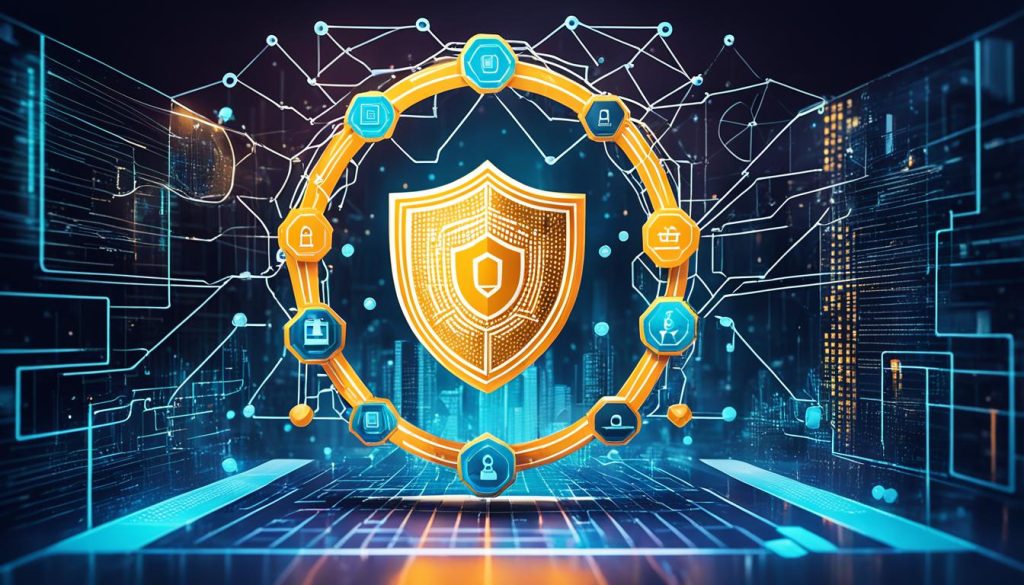Blockchain technology is taking off in France, bringing innovation to many sectors. It has the power to change industries and make the economy more transparent. This will have a big effect on France’s economy.
It’s important to understand what blockchain is all about. Essentially, it’s a system that keeps track of transactions across many computers. This means that records are permanent, secure, and open for all to see.
Blockchain’s impact is seen in finance, logistics, healthcare, energy, and more. Companies use it to make processes better, work more efficiently, and build trust.
Blockchain brings many benefits. It makes auditing easier and gets rid of middlemen. This reduces costs, fights fraud, and keeps data safe. It puts people and businesses in charge of their digital belongings.
In banking and finance, blockchain can make payments faster and safer. It helps fight fraud and meets regulatory needs. France’s top banks are exploring how blockchain can improve their services.
In logistics, blockchain provides clear records from start to finish. This ensures product quality, ethical sourcing, and trust in the supply chain. It makes the supply chain better, cheaper, and more trustworthy.
The health sector uses blockchain for secure data and medical records management. It allows easy sharing of information between health providers. This leads to better care for patients.
France is using blockchain for greener energy solutions too. It supports peer-to-peer energy trading and reliable renewable energy use. Blockchain can lead to a more sustainable energy future.
The French government supports blockchain with various initiatives. These efforts aim to encourage new ideas, help startups, and make a good setting for blockchain use in various fields.
France is now a place where blockchain companies grow. It attracts investments from all over the world. These companies are changing finance, logistics, healthcare, and green energy.
But, introducing blockchain has its challenges. Issues like scalability, privacy, rules to follow, and getting everyone on board are important. These need solutions for blockchain to work well.
Blockchain in France looks very promising for the future. As it grows, its ability to change industries and boost the economy is huge. Working together globally will help blockchain innovation even more.
What’s happening with blockchain in France can teach the UK and others a lot. By looking at France’s success, other countries can use blockchain to change industries, make things more transparent, and improve the economy.
Key Takeaways:
- Blockchain technology is revolutionizing industries in France, offering transparency, efficiency, and enhanced data security.
- France’s finance, supply chain, healthcare, and energy sectors are witnessing the positive impact of blockchain implementation.
- Blockchain enables real-time auditing, eliminates intermediaries, reduces costs, and enhances trust between stakeholders.
- The French government is actively promoting blockchain adoption through initiatives and regulations.
- Blockchain startups and investments in France are contributing to the growth of the blockchain ecosystem.
Understanding Blockchain Technology
Blockchain technology is changing the digital world in a big way. It’s a digital ledger that doesn’t rely on central control. This technology brings security, openness, and unchangeable records without needing middlemen. It introduces a new trust and efficiency level in many areas.
So, what is blockchain? It’s a series of connected blocks that store data about transactions. Each block has a special code and timestamp that links it to the last block. This makes a secure and unchangeable record of all transactions.
Blockchain’s power lies in its decentralized setup. It runs across a network of computers, with each holding a copy of all records. This setup keeps data safe and transparent by spreading it out.
Blockchain uses a special process to add new transactions. This doesn’t depend on any central figure, stopping fraud and interference. Methods like proof-of-work or proof-of-stake make sure every transaction is correct. This keeps the blockchain accurate and secure.
The Benefits of Blockchain Technology
Blockchain brings a lot of advantages to different fields. It boosts security and privacy by cutting out middlemen, which also lowers costs. This technology makes transactions clear, traceable, and auditable. It’s great for finance, managing supplies, and healthcare.
Applications of Blockchain Technology
In finance and banking, blockchain is making big changes. It makes transactions across borders quicker, cheaper, and transparent. This reduces issues and helps more people access financial services.
Blockchain also improves supply chain management. It allows for tracking products all the way, from creation to the final buyer. This cuts down on fake products and makes supply chains better.
In healthcare, blockchain protects patient records and makes sharing information easy between providers. It also makes clinical trials more transparent. This builds trust in the pharmaceutical field.
Overall, blockchain technology can hugely change how businesses run, how we handle digital assets, and keep data safe. Its decentralized and open nature opens up new opportunities. It leads to a digital future that’s more secure and efficient.
The Rise of Blockchain in France
France is quickly adopting blockchain technology, changing its business world. Many businesses from small startups to big players are using blockchain. They aim to change business operations, boost security, and make things more transparent.
The French government sees blockchain’s big potential and supports its growth. It has made supportive laws and initiatives to encourage the use of blockchain. France is becoming a top country in blockchain technology thanks to this support.
The finance sector in France has welcomed blockchain, using it to make transactions smoother, more efficient, and cheaper. Société Générale and Banque de France are using blockchain in their work. This is making the banking system safer and more efficient.
Blockchain is also improving supply chain management, changing how goods are tracked. LVMH, a top luxury group in France, uses blockchain to verify its products’ authenticity. This technology helps fight fake goods and build trust with customers.
The healthcare sector is also exploring blockchain. Companies like Sanofi are testing blockchain to safely keep and share patient records. This ensures data privacy and improves the sharing of information among healthcare providers.
The Role of Blockchain in France’s Business Landscape
Blockchain brings many benefits to French businesses. It promotes working without middlemen, builds trust, and keeps data safe and unchanged. This makes sure data stays true and safe from fraud.
Using blockchain, businesses can make their operations smoother, cut costs, and work more efficiently. They can automate contract management, track supply chains better, and keep records more accurately. This reduces mistakes and inefficiencies.
Furthermore, blockchain secures data through encryption and a safe, unchangeable storage system. This protects confidential information, crucial for finance, healthcare, and supply chains.
The Benefits of Adopting Blockchain in France
Adopting blockchain in France brings many benefits. These benefits touch on:
- Improved transparency and traceability
- Enhanced security and data privacy
- Reduced transaction costs
- Increased operational efficiency
- Streamlined supply chain management
- Accelerated digital transformation
| Industry | Companies | Use Cases |
|---|---|---|
| Finance | Société Générale, Banque de France | Efficient and secure transactions |
| Supply Chain Management | LVMH | Product traceability and authenticity |
| Healthcare | Sanofi | Secure storage and sharing of patient records |
As blockchain spreads through France’s business areas, the country leads in digital innovation. With more companies seeing its value, France is on its way to become a top blockchain leader.
Benefits of Blockchain Technology

Blockchain technology improves transparency, security, and efficiency in various fields. Organizations using it can achieve better results and build trust among stakeholders.
Transparency
Blockchain’s transparency is a major benefit. Its decentralized setup allows everyone access to the same data, cutting out middlemen. All transactions are open and available to those allowed to see them. This makes it perfect for supply chain management and healthcare.
Security
Blockchain has strong security, protecting against unauthorized changes. Each transaction is encrypted and connected to the previous one. This creates a secure chain that’s hard to change undetected. Its reliability is key for sectors handling confidential info, like finance.
Efficiency
Organizations can become more streamlined and efficient using blockchain. Smart contracts execute agreements written into code automatically. This cuts out intermediaries, saving time and money while reducing mistakes. It leads to better and more reliable results in various industries.
| Benefits | Blockchain Technology |
|---|---|
| Transparency | Blockchain provides a transparent record of transactions that is accessible to all authorized participants. |
| Security | Utilizing encryption and a decentralized network, blockchain ensures secure and tamper-proof transactions. |
| Efficiency | Smart contracts automate processes, reducing the need for intermediaries and enhancing operational efficiency. |
| Cost Savings | By eliminating intermediaries and streamlining processes, blockchain technology can result in significant cost savings. |
| Data Integrity | The immutability of blockchain transactions ensures the integrity and accuracy of data. |
Blockchain technology’s impact goes beyond the obvious benefits. It offers a chance for businesses to evolve by embracing its innovative potential.
Blockchain in Finance and Banking
Blockchain technology is becoming popular in finance and banking. It changes old financial methods by bringing a clear and decentralized record system. This helps in making money moves smoother, building trust, and improving ways to stop fraud.
Streamleinancial Transactions
Blockchain makes moving money easier, especially across borders. Usually, these transactions take a lot of time and involve many middlemen. Blockchain cuts out these middlemen and lowers costs. Smart contracts make payments quicker and simpler, boosting transaction efficiency.
Enhancing Trust
Trust is crucial in finance and banking. Blockchain offers an open and permanent ledger, letting all users see transaction details in real-time. This cuts down fraud risks and ensures that data is accurate. The system doesn’t need a central authority, reducing chances of data tampering.
Effective Fraud Prevention
For stopping fraud, blockchain is very effective. Each deal is securely linked to the one before it, making it really hard to change any data. This fixed and open nature makes fraud tough. Plus, everyone in the network must agree on transactions, adding an extra security layer against scams.
| Benefits | Applications |
|---|---|
| Efficient and cost-effective financial transactions | Remittances, international transfers |
| Enhanced trust and transparency | Know Your Customer (KYC) processes, regulatory compliance |
| Strong fraud prevention | Identity verification, secure document storage |
Blockchain in Supply Chain Management
Blockchain technology has recently captured attention for its role in transforming supply chains. Its features of transparency and immutability enhance traceability, verification, and protection against counterfeits.
Traceability is vital in supply chains, helping businesses follow goods from origin to consumer. Blockchain allows for a decentralised, secure system to record every goods transaction. This makes every step traceable, transparent, and verifiable.
Verification in supply chains is enhanced by blockchain. It moves away from error-prone, paper-based systems to automated, reliable records. This shift reduces errors, fraud, and increases operational efficiency. Immutable records on the blockchain ensure trust and lower the risk of fake goods.
Counterfeit prevention benefits greatly from blockchain. It safeguards brand reputation by assuring product authenticity. This deters fake goods trade, protecting manufacturers and consumers.
Blockchain-enabled Supply Chain Management: Use Cases
Blockchain has improved supply chains in areas like:
- Food safety: Blockchain lets consumers track their food’s origin, ensuring it’s safe and high quality.
- Pharmaceutical safety: It prevents counterfeit drugs by tracking each drug’s journey from production to patient.
- Luxury item authentication: It helps luxury brands confirm product authenticity, reducing counterfeit trade.
- Efficient logistics: Combining blockchain with IoT devices optimises logistics, cutting costs and boosting efficiency.
Blockchain is set to revolutionise supply chain management. It promises more transparent, efficient, and secure supply chains. As blockchain use grows, supply chain practices are expected to advance significantly.
Blockchain in Healthcare

The healthcare sector stands to gain a lot from using blockchain technology. It’s focused on data security, interoperability, and patient privacy. These factors could change healthcare systems around the world.
Blockchain’s key benefit in healthcare is its data security feature. It uses encryption and keeps data in many places, making it super secure. Doctors and patients can be sure their information is safe from hackers and changes.
Next, blockchain improves interoperability in healthcare. Right now, patient information is scattered across different systems. This makes sharing and accessing data hard. But, with blockchain, health records can be shared smoothly and safely between doctors. This leads to better care and fewer mistakes.
Also, blockchain technology puts patient privacy first. It lets patients control their own health information. They use smart contracts to choose who sees their medical records. This makes patients trust their doctors more, creating better health partnerships.
Blockchain can solve many problems in healthcare. It can make medical records more accurate, simplify admin tasks, stop fraud, and support research by sharing data safely.
| Benefits of Blockchain in Healthcare | Explanation |
|---|---|
| Enhanced Data Security | Blockchain technology ensures the secure storage and transmission of sensitive medical information, protecting it from unauthorized access. |
| Improved Interoperability | Blockchain enables seamless sharing of health records between healthcare providers, enhancing care coordination and patient outcomes. |
| Empowered Patient Privacy | Through smart contracts and permissioned access, patients have control over who can access their medical data, promoting trust and collaboration. |
Blockchain technology is set to change the healthcare field by boosting data security, making data sharing easier, and keeping patient privacy safe. As health services see the benefits of blockchain, more will start using it. This will change how we give care, making things better for patients.
Blockchain in Energy and Sustainability
Blockchain technology could change the energy and sustainability sectors completely. It makes transactions secure and easy to see. This means it can help track green energy, enable trading of carbon credits, and allow energy trading without central control.
One big problem with green energy is proving where it comes from. Blockchain stores renewable energy certificates safely, showing clearly where energy originates. This lets customers pick green energy confidently, helping the market grow.
Trading carbon credits is crucial in fighting climate change. Blockchain can improve this process. Instead of using central exchanges, blockchain allows for direct trading. This makes transactions clearer and encourages companies to lower their carbon emissions, leading to a greener future.
Blockchain can also change how we trade energy. It lets energy makers and users swap excess power directly. This system encourages the use of renewable energy. It also brings energy to isolated places and reduces the need for fossil fuels.
Benefits of Blockchain in Energy and Sustainability:
- Enhanced transparency and trust in renewable energy sources
- Efficient and secure carbon credits trading
- Decentralized energy trading for improved accessibility and sustainability
| Application | Potential Benefits |
|---|---|
| Tracking renewable energy sources | Increased consumer confidence and market growth |
| Carbon credits trading | Efficiency, transparency, and incentivization |
| Decentralized energy trading | Promotion of renewable energy adoption and improved energy access |
Government Initiatives and Regulations
The French government understands the value of blockchain technology. It has actively worked to support and guide its growth. Through clear policies and regulations, France is leading in this innovative field.
Regulatory Framework
France has set guidelines for those in the blockchain field. These rules make sure everyone follows legal and financial standards. This helps in building trust and letting businesses use blockchain in various sectors confidently.
Policy Support
The French government sees blockchain as a key part of its digital strategy. It supports research, encourages partnerships, and attracts investors. Initiatives focus on using blockchain in finance, healthcare, and more, pushing for innovation and application.
Collaboration and International Partnerships
France doesn’t just focus on national efforts. By working with other countries through the European Blockchain Partnership, it aims for wider use and understanding of blockchain. This teamwork leads to better technology and a stronger global network.
| Benefits of Government Initiatives and Regulations | Examples |
|---|---|
| Promotes innovation and growth | Encourages blockchain startups and investments |
| Enhances regulatory compliance | Ensures transparency and accountability in business operations |
| Attracts foreign investment | Establishes France as a favorable destination for blockchain projects |
| Stimulates collaboration and knowledge exchange | Strengthens international partnerships for blockchain development |
Blockchain Startups and Investments in France

France is a hot spot for blockchain startups, drawing in venture capital firms. Its environment and laws support blockchain innovations. This has led to the success of many startups.
Stratumn, a leading blockchain company in France, focuses on secure data handling and improving business processes. Its innovative strategies have caught the attention of investors. Stratumn is now a notable name in the blockchain sector.
Ledger, another key player, specializes in secure systems for cryptocurrencies. They’re known for their hardware wallets. Ledger’s technology has attracted a lot of investment, helping it to grow.
The Role of Venture Capital
Venture capitalists are essential for blockchain startups in France. They offer the funds and knowledge needed for these companies to expand. This support helps startups reach new heights.
France has also seen the rise of blockchain-focused investment funds. Partech Ventures is one example, investing in groundbreaking blockchain startups. Their expertise and strategic choices have led to successful investments.
Investment Opportunities
Investing in French blockchain startups is a smart move for venture capitalists. The technology is advancing and can transform many industries. This creates a promising investment landscape.
Investors have various options, from supply chain innovations to finance platforms. Investing in diverse startups reduces risks and increases possible gains. The French government supports this growth with visas and tax breaks for startups.
The blockchain field in France is flourishing, offering many chances for investors. With ongoing innovation, venture capitalists can find high-growth startups. France’s blockchain scene is ripe for investments.
Challenges and Considerations for Blockchain Implementation
Introducing blockchain technology involves challenges and key points that need careful consideration. These include how to scale, work across different systems, and follow the law. We’ll look at these important areas next.
Scalability
Scalability is a big issue with blockchain. When more people join and more transactions happen, the system has to keep up. Solutions like sharding and sidechains are being developed. They help blockchains handle more data without slowing down.
Interoperability
Interoperability matters a lot for blockchain to work well. Because blockchains use different rules, linking them together can be hard. It’s important to make rules and standards. They make sure blockchains can talk to each other, share data, and work smoothly.
Regulatory Compliance
Following legal rules is a must for using blockchain. The technology’s spread-out nature makes privacy, security, and law compliance tricky. Blockchain systems have to follow laws, like those about data protection and preventing money laundering. This keeps trust in the technology.
Laws can be different depending on where you are and what industry you’re in. Knowing the legal rules well is important. Talking to legal groups and industry bodies can help understand and follow these laws. This makes adding blockchain into systems easier.
| Challenges | Considerations |
|---|---|
| Scalability | Exploring sharding and sidechains to handle growing workloads |
| Interoperability | Establishing standards and protocols for seamless connectivity |
| Regulatory Compliance | Adhering to data privacy, security, and legal requirements |
Dealing with scaling, connecting different systems, and legal rules is vital for blockchain success. Companies must think about these issues. They should work together with experts to create strong and legal blockchain systems.
Future Prospects of Blockchain in France
The future of blockchain in France looks very bright. This cutting-edge technology is expected to spark innovation. It will also drive digital changes across different areas.
Accelerating Innovation
Blockchain can change many industries with its decentralized, clear nature. It makes secure, reliable transactions possible. This can make things more efficient, cut costs, and simplify complex processes. We should see ongoing innovation and breakthroughs in blockchain.
Driving Digital Transformation
Today, digital change is essential for businesses. Blockchain technology introduces strong solutions that can update old systems. It offers more automation, better data handling, and stronger cybersecurity. As organizations see blockchain’s benefits, we expect more of them to use it in their digital plans.
Expanding Across Sectors
Finance was first to use blockchain, but now other areas are too. This includes supply chain, healthcare, and energy. Blockchain can improve operations and create growth opportunities. We believe its use will spread to even more industries soon.
With investments, partnerships, and government backing, blockchain’s future in France is strong. Companies should keep up with new trends and see how blockchain can help them digitally. France can become a leader in innovation and digital transformation with blockchain.
International Collaboration and Partnerships
In our connected world, working together is vital for growth. The blockchain industry knows this well. Cross-border partnerships are key to spreading new ideas and innovations.
When countries and organizations join forces, they bring their best strengths to the table. This unity helps create amazing blockchain solutions. It also makes these solutions fit into many sectors faster.
Sharing knowledge is a big benefit of working together. It lets blockchain enthusiasts learn from each other. They find new ways to use technology through sharing.
Also, international partnerships help businesses grow. Companies reach new markets and users by joining hands. They use each other’s customer networks to promote blockchain globally.
Examples of Successful Cross-Border Collaborations:
- IBM and Maersk are working to change global trade with blockchain. IBM’s tech expertise and Maersk’s industry know-how aim to make supply chains better.
- Ripple and SBI Holdings focus on quick, cheap cross-border payments. They combine Ripple’s tech with SBI’s network in Japan. It could change how money is sent abroad.
These examples show the power of sharing ideas across borders. It’s helping to push blockchain further. International partnerships will keep playing a huge role in blockchain’s future.
| Benefits of International Collaboration and Partnerships |
|---|
| Enhanced knowledge sharing and exchange of best practices |
| Access to diverse expertise and resources |
| Expansion of market reach and access to new user bases |
| Accelerated innovation and development of cutting-edge solutions |
Blockchain in the United Kingdom: Lessons from France
The blockchain industry is growing fast, and countries are learning from each other. The United Kingdom keeps an eye on France’s blockchain progress. The UK knows it’s vital to understand France’s experiences and consider its regulations’ impact.
France leads in adopting blockchain technology, thanks to its innovations and research support. Its friendly policies and support for private-public collaborations boost its blockchain status globally. The UK should use France’s strategies to advance its own blockchain journey.
France shows that government support is key to blockchain’s success. Its helpful attitude has created a booming blockchain scene. The UK should follow suit to boost innovation in finance, healthcare, and more.
Regulatory Impact
Regulation is essential for blockchain’s growth. France has set up rules that help the industry while protecting businesses and customers. The UK could learn from France’s regulatory impact and develop similar policies.
Working together, the UK and France could lead in blockchain innovation. Sharing insights and experiences can spark new ideas. This partnership could enrich both nations and the wider blockchain world.
The UK has much to learn from France in blockchain. By adopting France’s regulatory strategies and collaborative spirit, the UK could become a blockchain leader. Embracing lessons from France could spark innovation and growth
Conclusion
Throughout this article, we’ve seen how blockchain technology is growing in France. It’s changing many sectors for the better. France shows its support through various government actions and rules. These help increase the technology’s use in fields like finance, healthcare, and even energy.
By using blockchain, French organizations are making big changes. They’re improving how things work and starting new kinds of businesses. There’s a lot of energy around startups and investment in blockchain. France is also working with others around the world. This helps share knowledge and push blockchain forward.
In short, blockchain is a big deal for France’s future in innovation. It’s opening doors for businesses, the government, and everyday people. The effects of blockchain on France’s industries are just starting. There’s much more to come.
















